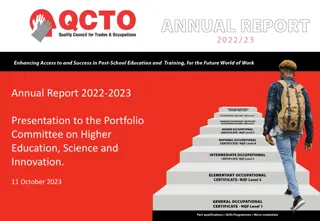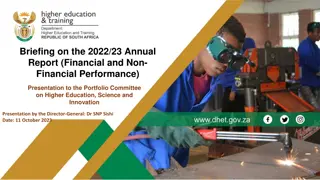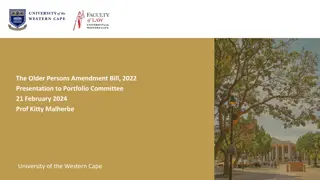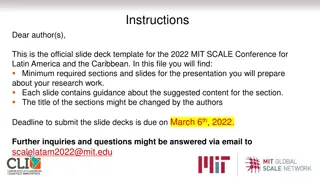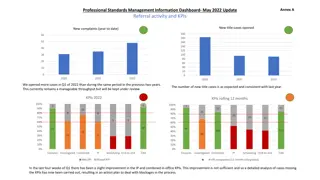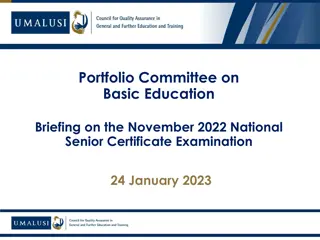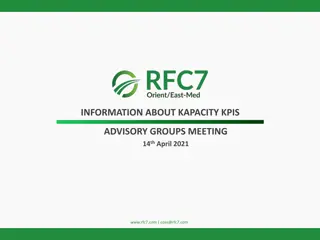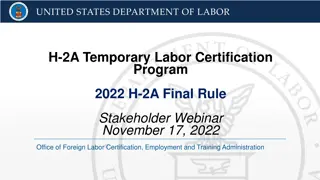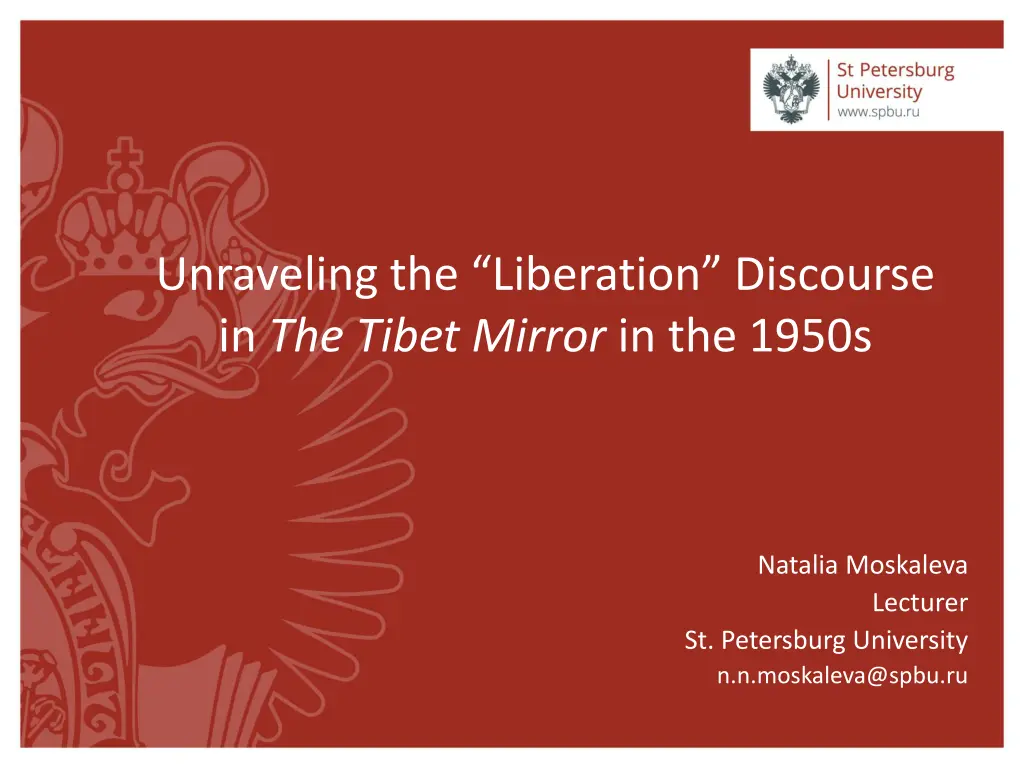
Unraveling Tibet's Liberation Discourse
Explore the historical context of Tibet's liberation discourse in the 1950s through an analysis of The Tibet Mirror publications. Delve into the perspectives on why Tibet should or should not be liberated, along with the socio-economic impact of the liberation articles. Discover the terminological explications and letters from readers, shedding light on the complexities of the liberation concept in Tibet.
Download Presentation

Please find below an Image/Link to download the presentation.
The content on the website is provided AS IS for your information and personal use only. It may not be sold, licensed, or shared on other websites without obtaining consent from the author. If you encounter any issues during the download, it is possible that the publisher has removed the file from their server.
You are allowed to download the files provided on this website for personal or commercial use, subject to the condition that they are used lawfully. All files are the property of their respective owners.
The content on the website is provided AS IS for your information and personal use only. It may not be sold, licensed, or shared on other websites without obtaining consent from the author.
E N D
Presentation Transcript
Unraveling the Liberation Discourse in The Tibet Mirror in the 1950s Natalia Moskaleva Lecturer St. Petersburg University n.n.moskaleva@spbu.ru
Liberation Discourse The delegates in Beijing in 1951 ushered a new chapter in Sino- Tibetan relations and officially ended the conflict over the Tibet Question. Goldstein M. The Snow Lion and the Dragon. China, Tibet, and the Dalai Lama: 47 Seventeen-Point Agreement signed by Tibetan What is liberation ? Why Tibet should not be liberated ? Should China be liberated instead? Dorje Tharchin Babu (1890 1976) in The Tibet Mirror
The Tibet Mirror on Liberation: terminological explications news with an attempt of analysis of the socio-economic impact of the liberation articles on Tibetan history trying to prove that there was no reason to be liberated letters to the editorial board from readers-eyewitnesses of the liberation news on liberation in the form of illustrations songs of liberation poems short didactic pieces fashioned as the gtam dpe genre
Liberation Concept in 1. The Tibet Mirror Vol.XVIII No.4, January 1950 2. The Tibet Mirror Vol.XVIII No.12, November 1950 3. The Tibet Mirror Vol.XIX No.7, October 1951 4. The Tibet Mirror Vol.XIX No.8, November 1951 5. The Tibet Mirror Vol.XX No.2 3, May June 1952 6. The Tibet Mirror Vol.XX No.5, August 1952 7. The Tibet Mirror Vol.XX No.7, October 1952 8. The Tibet Mirror Vol.XXI No.8, November 1953 9. The Tibet Mirror Vol.XXI No.10, January 1954 10. The Tibet Mirror Vol.XXII No.2, June 1954 11. The Tibet Mirror Vol.XXII No.5, September 1954 12. The Tibet Mirror Vol.XXV No.3 4, July August 1958 13. The Tibet Mirror Vol.XXV No.11, April 1959 14. The Tibet Mirror Vol.XXVI No.1, June 1959 15. The Tibet Mirror Vol.XXVI No.6 7, November December 1959
The Nominative Field of the Concept The Tibet Mirror Term Used Vol.XVIIINo.4, January 1950:2,7 [to] liberate (English) Vol.XVIIINo.4, January 1950:2,7 li sbe re Te (a Tibetan transliteration of the English term) Vol.XVIIINo.4, January 1950:2,7 sgrol ba ba am thar bar byed to make free/liberated Vol.XVIIINo.12,November1950:3 grol to become liberated / to get free/loose/untied Vol.XXNo.5,August1952:8; sgrol to liberate / to free Vol.XXNo.7,October1952:8 Vol.XXNo.5,August1952:8 bsgral(past and future of sgrol to liberate / to free ) Vol.XXVINo.1, June1959:suppl.2 rang dbang sprod to emancipate / to give freedom Vol.XXVINo.1, June1959:suppl.2 bcing bkrol gnang to liberate / to provide liberation Vol.XXVINo.6 7,November December1959:9 bcing bkrol btang liberated Vol.XVIIINo.12,November1950:3 grol ba liberation Vol.XXNo.7,October1952:8; thar ba liberation / salvation Vol.XXVNo.11,April 1959:4 Vol.XXINo.10,January 1954:1; bcing dkrol liberation Vol.XXIINo.2, June1954:12; Vol.XXIINo.5, September1954:11 Vol.XIXNo.7,October1951:2; bcings bkrol liberation Vol.XIXNo.8,November1951:4; Vol.XXNo.2 3,May June1952:3, 8, 10; Vol.XXINo.8,November1953:4; Vol.XXIINo.5, September1954:11 Vol.XXVNo.3 4, July August1958:7, 10; bcing bkrol liberation Vol.XXVINo.1, June1959:5
Interpretation of the Concept What is liberation ? (bcings bkrol ces pa i don ga re red) The Tibet Mirror Vol.XIX No.7, October 1951: 2 1. bcings is the past tense form of the verb ching to tie , which means, for instance, when an aggressor possessing the power ties the limbs of a weak and powerless one with a rope or fetters, or when a cruel hunter hunted down and encaged a gazelle or a predator such as a tiger, lion, etc. which were carelessly living in the wilderness before and which now have to live begging for food from the hunter, or when an aggressive state that has political power, money and military might, subjugates a weak, but independent state. 2. As for the second syllable bkrol, it is the past tense form of the verb grol to untie / to loosen , which denotes an action when somebody who possesses the power and righteous intentions by protecting and helping sets free those that were tied, caught with a lasso or subjugated with military and peaceful strategies, as in the above-mentioned example [with the verb ching to tie ], and now they can live as before on their own, independently and freely.
The Nucleus of the Concept Tibet s liberation by the PLA is either unfathomable or at least has the opposite of the literal meaning of the term liberation. January 1950 (Vol.XVIII No.4: 2, 7): If to translate into Tibetan the meaning of the word li sbe re Te zhes pa i tshig don bod skad du bsgyur [to] liberate , [it is] to make free or liberated. It is na sgrol ba am thar bar byed par do ste deng rgya uncertain what is the meaning of the stated now gzhung gsar pa nas yang yang brjod gsal la ring again and again by the new Chinese government that min bod sgrol bar byed rgyu yin zhes pa i don ci yin soon Tibet will be liberated. cha ma rtogs/
November 1950 (Vol.XVIII No.12: 3) The statement that communist China will liberate Tibet rgya dmar nas bod in a la sogs pa i dbang nas grol from the influence of England, America, etc. is rgyu yin brjod pa kyag rdzun kyag nag red/ [ ] bod completely untrue. [ ] Tibet is a self-sufficient state. Is rang tsho i rgyal khab red/_de la rgya dmar gyis not it very inappropriate that communist China wants btson pa bzod dod de ha cang ma rung pa zhig ma to make it [Tibet] a prisoner? red dam/ You, Chinese communists, are saying that [you] khyed rgya dmar rnams rgya nag grol ba yin brjod kyi liberated China. If you do not understand now that you dug ste/_khyed rnams la u ru su dmar po i zhags thag were tied with a red lasso of communist Russia which is dmar po me dang mtshungs de yis bcings yod pa like a fire, [you] will certainly understand [it] in the khyed rnams da lta ha go yi mi dug kyang rjes su ha future. If you do understand, will not it be nice if you go nges gtan red/_gal srid ha go yi yod na gzhan la leave alone bullying others and try to set [yourselves] dbang yod byed rgyu par bzhag nas rang u ru su i free from Russian influence? dbang og nas grol ba i thabs byas na mi legs sam/
November 1953 (Vol.XXI No.8: 4) Nevertheless, I have not understood what is the on kyang bod kyi mi rnams la su gang zhig gis meaning of saying that [the Chinese communist bcings med pa la bcings bkrol byas dang byed rgyu government] has liberated and is liberating yin zhes pa i don ga re yin nam ha go ma byung / Tibetan people who were not constrained by anyone.
January 1954 (Vol.XXI No.10: 1) Two years passed since the camp of the [People s] bod la bcing dkrol dmag sgar phebs ste lo ngo Liberation Army arrived in Tibet. [Tibetans] looked gnyis song /_gsum ngo bltas song /_bcing dkrol at the third year, [but] did not understand the zhes pa ji yin don ni ha go ma song / meaning of the so called liberation.
The Liberation Is Also: a trick a lie supposed to break the pride of Tibetan people bewildering scary burdening undemocratic unwanted oppressive violent mad and dangerous for the whole world
News on Liberation in Pictures (bcing bkrol ri mo i gsar gyur) The Tibet Mirror Vol.XXV No.3 4, July August 1958: 7, 10


